Blood Pressure & Hypertension
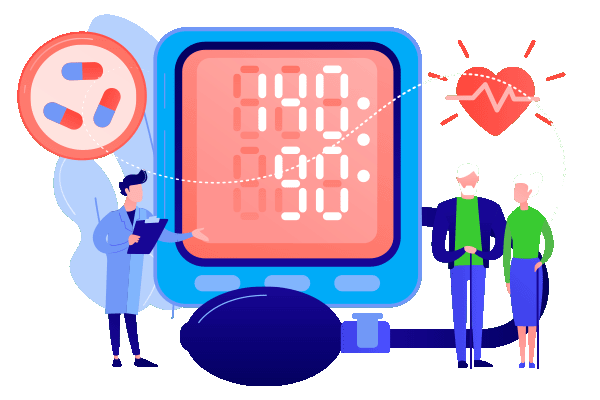
What is blood pressure and what is hypertension?
Blood pressure is the pressure of blood pushing against the walls of your arteries as they carry blood from your heart throughout your body. Your blood pressure rises and falls during the day depending on your level of activity.
High blood pressure (also known as hypertension) is a condition in which the force of the blood against your artery walls is abnormally high for extended periods of time. This poses serious health risks, such as heart disease and stroke.
How is blood pressure measured?
Blood pressure is usually measured with the use of an arm cuff that is pumped up with air. The cuff detects the flow of blood through your arm and records the pressure against the walls of your arteries.
A blood pressure reading is given in millimeters of mercury (mm Hg) and has two numbers.
- Top number (systolic pressure). The top number is a measurement of the pressure in your arteries when your heart beats.
- Bottom number (diastolic pressure). The lower number is a measurement of the pressure in your arteries between each heartbeat when your heart is resting.
For example, if your blood pressure monitor reads 110 systolic and 70 diastolic, your reading is “110 over 70.” It is written as 110/70 mmHg.
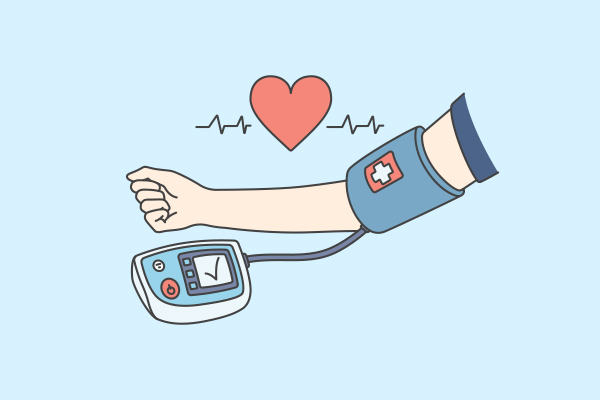
What blood pressure numbers indicate hypertension?
A normal blood pressure level is classified as 120/80 mmHg or less. Measurements above these numbers put you in the high blood pressure range.
What are the symptoms of hypertension?
Most people who have high blood pressure do not have any signs or symptoms, even at dangerously high levels. Individuals can have high blood pressure for years without any symptoms.
A few people with hypertension have headaches, shortness of breath, or nosebleeds, but these symptoms usually do not occur until the levels have reached a very dangerous or life-threatening stage.
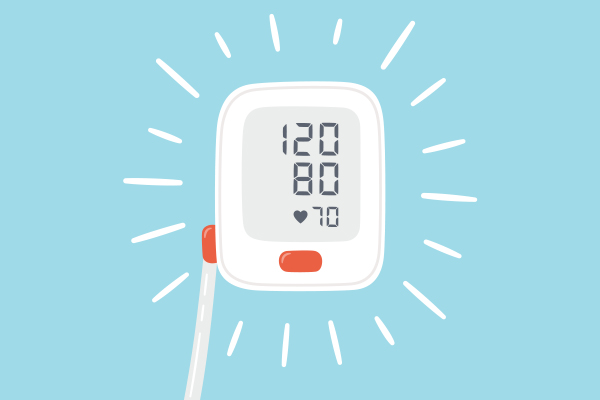
Fortunately, high blood pressure can be easily detected with a blood pressure arm cuff and monitor. And once you know you have high blood pressure, you can work with medical professionals and nutritionists to get it under control.
How often should I have my blood pressure checked?
A blood pressure reading is typically taken as part of your annual physical. If not part of your provider’s routine, ask for a blood pressure reading at least every two years starting at age 18. If you are 40 or older, or you are 18 to 39 with a high risk of high blood pressure, make sure you get one every year.
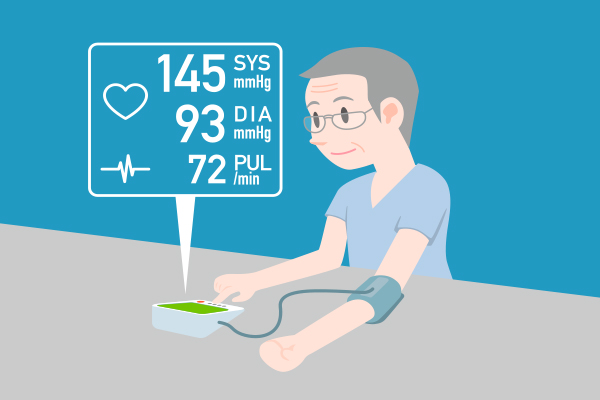
Your healthcare provider will recommend more-frequent blood pressure readings if you have already been diagnosed with high blood pressure and are on medications or a treatment plan, or if you have other risk factors for cardiovascular disease.
Note that public blood pressure machines found in pharmacies and health resource fairs may provide helpful information about your blood pressure, however, they can have some limitations. The accuracy of a machine depends on several factors. You must have the correct cuff size and know how to use the machine properly. Ask your healthcare provider for advice if you wish to make use of these public blood pressure machines.
Another option for keeping an eye on your blood pressure is to order your own blood pressure cuff and monitor from a pharmacy. Get a recommendation from your healthcare provider, be sure to order the correct arm cuff side, and read the directions carefully to ensure accurate readings.
What are the two types of hypertension?
There are two types of high blood pressure: primary (also known as essential) hypertension and secondary hypertension.
Primary (essential) hypertension
For most adults with hypertension, there is no identifiable cause. This type of high blood pressure is called primary hypertension and it develops gradually over many years. Sometimes young adults, even school athletes, have essential hypertension.
Secondary hypertension
Secondary hypertension, caused by an underlying condition, tends to appear suddenly and cause higher blood pressure than does primary hypertension. Various conditions and some medications can lead to secondary hypertension, including:
- Kidney disease
- Obstructive sleep apnea
- Thyroid problems
- Adrenal gland tumors
- Certain defects in your blood vessels that you were born with
- Certain medications, such as birth control pills, over-the-counter pain relievers, cold remedies, decongestants, and some prescription drugs
- Drugs, such as amphetamines and cocaine
What are the risk factors of high blood pressure?
High blood pressure has many risk factors, including:
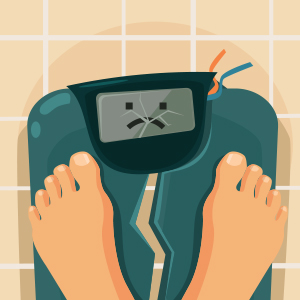
Being overweight or obese. The more an individual weighs, the more blood that is needed to supply oxygen and nutrients to tissues. As the amount of blood flowing through your blood vessels increases, the pressure on your artery walls also increases.
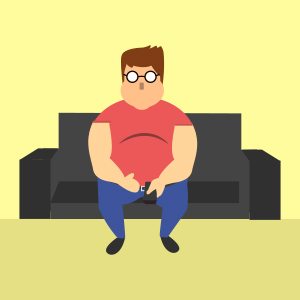
Not being physically active. Individuals who are not physically active tend to have higher heart rates. The higher the heart rate, the harder the heart must work with each contraction and the stronger the force is on the arteries.

Age. The risk of high blood pressure increases as you age. Hypertension is more common in men than women until about age 65 when the risk is the same for both sexes.

Race. High blood pressure is particularly common among people of African heritage and often develops at an earlier age than in the white population. The serious complications of hypertension, such as heart attack, kidney failure, and stroke are also more common in people of African heritage.
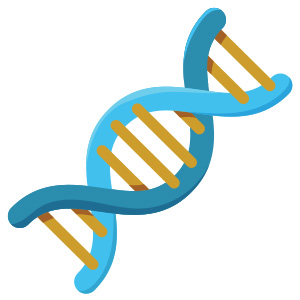
Family history. High blood pressure tends to run in families.
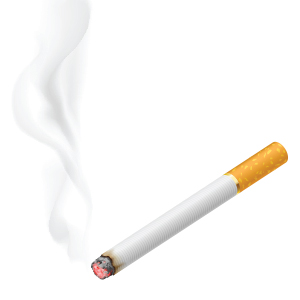
Tobacco use and tobacco smoke. Smoking or chewing tobacco immediately raises blood pressure temporarily, but the chemicals in tobacco can also damage the lining of your artery walls in the longer term. This can cause your arteries to narrow and will increase your risk of heart disease. Secondhand smoke also can increase heart disease risk.
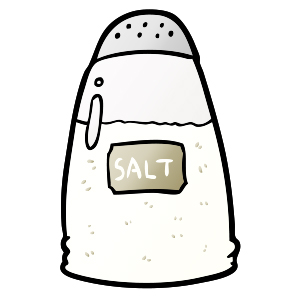
Too much salt (sodium) in your diet. Too much salt in your diet can cause your body to retain fluid which can increase blood pressure.
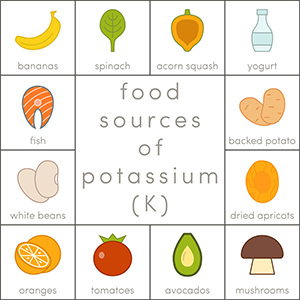
Too little potassium in your diet. Potassium helps balance the amount of sodium in your cells for good heart health. If you have too little potassium in your diet, or you lose too much potassium due to dehydration or other health conditions, sodium can build up in your blood and increase blood pressure.
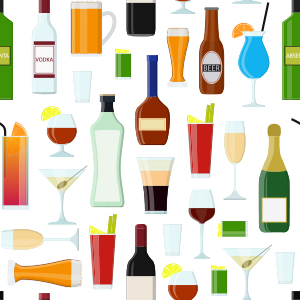
Drinking too much alcohol. Having more than one drink a day for women and more than two drinks a day for men can affect your blood pressure. If you drink, do so in moderation.

Stress. Constant high levels of stress can lead to hypertension.
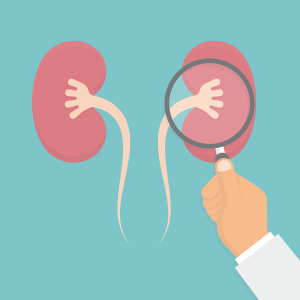
Certain chronic conditions. Certain chronic conditions can also increase the risk of high blood pressure, including diabetes, kidney disease, and sleep apnea.

Pregnancy. Sometimes pregnancy can contribute to high blood pressure.
High blood pressure is mostly found in adults, but children may be at risk, too. For some children, high blood pressure is caused by problems with their kidneys or heart. And unfortunately, an increasing number of kids with poor diet and exercise habits are developing high blood pressure.
What are the long-term complications of high blood pressure?
Excessive, on-going pressure on your artery walls caused by high blood pressure can damage not only your blood vessels, but your organs as well. The higher your blood pressure and the longer it goes uncontrolled, the greater the damage will be.
Uncontrolled hypertension can lead to some of the following complications:
- Heart attack or stroke. High blood pressure can cause both hardening and thickening of the arteries (atherosclerosis). This can lead to a heart attack, stroke, or other complications.
- Heart failure. If you have high blood pressure in your arteries, your heart has to work harder to move blood. This causes the walls of your heart’s pumping chamber to thicken (called left ventricular hypertrophy). With time this thickened muscle may have a hard time pumping enough blood to meet your body’s needs. This can lead to heart failure.
- Aneurysm. Increased blood pressure in your arteries can cause your blood vessels to weaken, bulge, and form an aneurysm. If an aneurysm ruptures, it can be sudden and fatal.
- Weakened and narrowed blood vessels in your kidneys. Hypertension can prevent your kidney organs from functioning normally.
- Narrowed, thickened, or torn blood vessels in the eyes. This damage can result in vision loss.
- Metabolic syndrome. This syndrome is a group of disorders due to your body’s metabolism. It may include increased waist size, high triglycerides, decreased high-density lipoprotein (HDL) cholesterol (the “good” cholesterol), high blood pressure, and high insulin levels. These conditions make you more likely to develop diabetes, heart disease, and stroke.
- Memory or cognitive problems. Uncontrolled high blood pressure can affect your ability to think, remember things, and learn.
- Dementia. Narrowed or blocked arteries can limit blood flow to the brain. leading to a certain type of dementia (vascular dementia). A stroke that interrupts blood flow to the brain can also cause vascular dementia.
At LifeStyle Medical Center, our team of professionals is focused on long-term dietary and lifestyle changes that can lessen the risks associated with hypertension and other chronic diseases. Reversing weight gain, staying at a healthy weight, eating healthy foods, getting regular exercise, learning stress-reduction techniques can all bring your blood pressure level to a healthier place.
Are you ready to start down the path to a healthier you?
Reduce your risk of high blood pressure?
Take control of your health today. Better health IS within your reach. Take the first step today.
Call us today @ (919)354-7077
Sources:
- Centers for Disease Control and Prevention, https://www.cdc.gov/.
- Mayo Clinic, https://www.mayoclinic.org/.
- Johns Hopkins Medicine, https://www.hopkinsmedicine.org/health.
- Cleveland Clinic, https://my.clevelandclinic.org/health/diseases.
